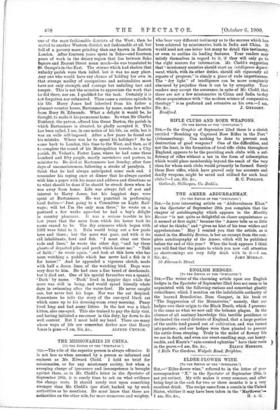ENGLISH HEDGES.
• [TO TEE EDITOR OF THE "SPECTATOR.") Sna,—The writer of the charming article upon our English hedges in the Spectator of September 22nd does not seem to be acquainted with the following curious and somewhat ghastly coincidence, which I mention on the indubitable authority of the learned Benedictine, Dom Gasquet, in his book on "The Suppression of the Monasteries," namely, that our hedges owe their origin to the Black Death, which I presume is the same as what we now call the bubonic plague. In the absence of all sanitary knowledge this terrible pestilence so decimated the rural districts of England, that a large portion of the arable land passed out of cultivation, and was turned into pasture; and our hedges were then planted to prevent the cattle from straying. Truly in the midst of flowery life we are in death, and even our sweet-smelling may, our honey- suckle, and Keats's "rain-scented eglantine" have their roots in the grave.—I am, Sir, &c., EmacE HonuNs. 2 Belle Fite Gardens, Walpole Road, Brighton."


















































 Previous page
Previous page